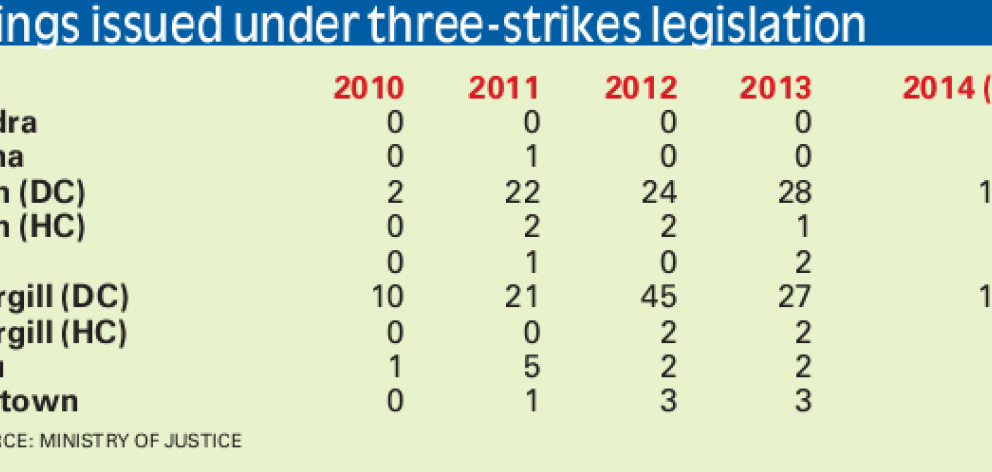
Dozens of sexual and violent offenders in Otago and Southland have been given warnings under the three-strikes legislation.
When the Sentencing and Parole Reform Act came into effect on June 1, 2010, it meant offenders convicted of any of 40 qualifying offences would receive a warning.
Those offences comprise all major violent and sexual offences with a maximum penalty of seven years' imprisonment or more, including murder, attempted murder, manslaughter, wounding with intent to cause grievous bodily harm, sexual violation, abduction, kidnapping, and aggravated robbery.
By the end of last month, 4340 offenders had been given a first warning across New Zealand, while 37 offenders had been given a second or final warning.
A final warning means those offenders must serve any future prison sentence without parole.
Justice Minister Judith Collins confirmed no offenders who had received a final warning had been reconvicted of one of the serious sexual and violent offences covered by the Act.
''I'm satisfied that this Government's Sentencing and Parole Reform Act 2010 [three strikes] is working as intended and sends a strong message to offenders that parole is a privilege, not a right.''
Ms Collins said claims the regime would ''fill prisons'' were misguided, with the prison population remaining static.
However, the actual effect of the new regime on the prison population was yet to be felt because only a small number of offenders (37) were on their final warning, hence no offenders had been sentenced to a term of imprisonment without parole, she said.
And her message for those offenders?''Under the law, reoffending can have very serious consequences and offenders would be wise to bear this in mind.''
She confirmed the Government had no plans to change the legislation.
Not so Act New Zealand which is campaigning for burglaries to be included as a qualifying offence.
''Three strikes for burglary is also appropriate because a disproportionate number of burglaries are committed by professional burglars - criminals who have decided that burglary is a crime that pays,'' Act leader Jamie Whyte said in a speech this week.
University of Otago law lecturer Prof Kevin Dawkins said a debate whether burglary should be included was one worth having as ''it is a precursor''.
''Not all sexual offenders are burglars, not all burglars are sexual offenders but many burglars graduate to sexual offending.''
He said it remained to be seen if the legislation was a deterrent for hardened criminals.
In district and high courts across Otago and Southland, some 241 strikes (warnings) had been recorded, the bulk of those from Invercargill (118) and Dunedin (96).











